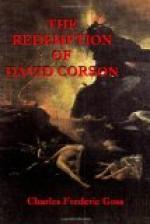But however limited his knowledge of men and affairs, the young mystic had acquired an extraordinary familiarity with the operations of the divine life which animates the universe. He seemed to have found the pass-key to nature’s mysteries, and to have acquired a language by which he could communicate with all her creatures. He knew where the rabbits burrowed, where the partridges nested, and where the wild bees stored their honey. He could foretell storms by a thousand signs, possessed the homing instinct of the pigeons, knew where the first violets were to be found, and where the last golden-rod would bloom. The squirrels crept down the trunks of trees to nibble the crumbs which he scattered for them. He could fold up his hands like a cup and at his whistle birds would drop into them as into a nest. His was a beautiful soul, and what Novalis said of Spinoza might have been said of him, “he was a God-intoxicated man.” He was in that blissful period of existence when the interpretations of life imparted to him by his elders solved the few simple problems of thought and action pressed upon him by his environment. He had never seriously questioned any of the ideas received from his instructors. He was often conscious of the infinite mystery lying beyond his ken, but never of those frightful inconsistencies and contradictions in nature and life by which the soul is sooner or later paralyzed or at least bewildered.
And so his outlook upon the universe was serene and untroubled. As he stood there in the deepening twilight he differed from the child who had approached him in this, that while the boy reveled in the beauty around him because he did not try to comprehend it, the youth was intoxicated by the belief that he possessed the clue to all these mysteries, and had a working theory of all the phenomena in the natural and spiritual world in which he moved. To such mystical natures this confidence is unavoidable anywhere through the period of the pride of adolescence; but it was heightened in this case by the simplicity of life’s problems in this narrow valley, and in the provincial little village which was the metropolis of this sparsely settled region. To him “the cackle of that bourg was the murmur of the world,” and his theories of a life lacking the complexities of larger aggregations of men seemed adequate, because he had never seen them thoroughly tested, to meet every emergency arising for reflection or endeavor. In this mental attitude of serene and undisturbed confidence that he knew the real meaning of existence, and was in constant contact with the divine mind through knowledge or through vision, every avenue of his spirit was open to the influences of nature. Through all that gorgeous day of May he had been drawing these influences into his being as the vegetation drew in light and moisture, until his soul was drenched through and through, and at that perfect hour of dusk, when the flowers and grasses exhaled the gifts they had received




